.
On 1 March, I first asked the question, "What Makes A Hero?"
in Fantasy, and since then have examined the part played by the Call, Circumstance,
Commitment,
Courage,
and meeting the Challenge.
Having done so, I believe these qualities are essential to the making of a Fantasy hero. In the next few posts I intend looking more closely at qualities that may be more moot. The first of these is charisma.
Charisma and the Fantasy Hero
Charisma, from glamour and the swashbuckling bravura that inspires others to emulate the hero’s behavior, through to allure and the ability to charm people to a cause, undoubtedly help us to cheer for a protagonist and engage with their ‘path of trials’, as Kim Falconer so aptly described it in her July 16 post.
Some of the more famous examples that have made it from book to screen include Aragorn in The Lord of the Rings, Daenerys in A Game of Thrones, and Reepicheep in several of the Narnia tales.
From
our first encounter with Aragorn as Strider, the mysterious, taciturn,
but extremely competent ranger, we feel the charisma that draws and holds the
hobbits to him, despite their initial misgivings. A charisma that develops with his path
through the story, until he is hailed as king at the book’s end. 
The mysterious Strider
Like Aragorn, Daenerys is a ruler-in-waiting, although she has
few allies and fewer friends at her story’s inception. She is also the
fairytale princess-lost who must win others to her cause.
Undoubtedly courage and wit play their part, but personal charisma, as well as
the allure and power of her dragons, are what allows Daenerys to rise from -nothing to become a power in the Seven Kingdoms.
Daenerys Targaryen
Reepicheep,
the valorous mouse of the Narnian tales, is a hero that leads from the front,
setting an example of both chivalry and swashbuckling bravura that inspires
unswerving loyalty in his followers, and respect and affection among others.
Reepicheep
Charismatic Duos
Obviously there as many examples as there are fantasy stories, but I have noticed that the genre does run to charismatic duos, from siblings, through brothers-in-arms (yes, the ‘bromance’!) to outright romance. One favourite example of sometime enemies, but also brothers-in-arms, comprises Rodrigo Belmonte and Amman ibn Khairan in Guy Gavriel Kay's classic, The Lions of Al-Rassan. One is a charismatic leader-of-men, the other a mysterious lone-wolf; both are champions of their respective kingdoms.
Another compelling and charismatic brothers-in-arms duos is that of Tenaka Khan and Ananais in David Gemmell’s The King Beyond the Gate.
Tenaka is the prince-in-exile, a loner whose charisma is based on his supremacy
with the sword. Ananais is the flamboyant and glamorous, but genuine, man of the people. Both are also very human, which is what makes their charisma more compelling.

Two actual brothers appear in the A Game of
Thrones (A Song of Ice and Fire)
series. Despite a tainted reputation, Jaime Lannister is the golden knight and
champion swordsman. His brother, Tyrion, by contrast, is a dwarf who must
survive by his wits in a warrior’s world. Nonetheless, he has a charisma, born
of ability, intellect, but also courage, that draws others to his cause. 
In
my own The Wall of Night series, a reviewer described the charismatic Honor
Captain, Asantir, as “Kick-Asantir”, while a reader wrote to implore
that I “please don’t kill Raven!”, the enigmatic knight-errant in The Gathering of the Lost (Wall #2) When
Daughter
of Blood (Wall #3) came
out, another reader commented on the extent of Tirael of Stars’ glamour, which
she seemed to appreciate. :-) 
Yet when it comes to charismatic Fantasy couples (as opposed to platonic
duos, however dynamic), I really can’t go past Katsa and Po in Kristin Cashore’s
Graceling.
Both are “graced” with enhanced magical skills, both are young and beautiful
and physically courageous, as well as being head over heels in love with each
other. AKA: charisma in spades right here, folks
That
being said, fans of Ronan and Adam in Maggie Stiefvater’s Raven Boys series will doubtless call for their top billing—although arguably the glamour chiefly lies
with the intense, gifted, but conflicted Ronan. 
Not Necessarily Charismatic – But A Hero Nonetheless
The question remains, though, whether charisma is necessary to a Fantasy hero.
For example, Frodo in The Lord of the Rings is a good person and a brave one, taking on a physical, psychological, and emotional challenge that more powerful folk rightly fear. Arguably, though, Frodo is not charismatic. His path is dangerous, dogged, and dirty, but without the clarion trumpet call or glorious charge of glamour. Also, and I suspect this may also mitigate against charisma, we perceive the extent of Frodo’s suffering. Yet in the end, his role is central to saving the world.
Similarly,
in the Fionavar series, the exiled Prince Aileron, although the “true and rightful” king, an expert
swordsman, and absolutely committed to resisting evil, is
missing-in-action in the charisma stakes. Think Aragorn-as-Strider in terms of dourness
and competence, but without the saving glimmer of humor and human warmth. In
terms of deeds and commitment, though, he’s unquestionably a hero.
Myr,
the Daughter of Blood of the title in
The Wall of Night #3 is honorable, morally
courageous, and loyal. She’s also shy, retiring, and acutely aware that she lacks the charisma
expected of those in her position: 
“She had not won them over, she could see it. … I was too esoteric, she thought…”
Later, though, Myr is told that (despite lacking charisma) her deeds place her “among the great heroes of the Derai.”
Other,
similar examples include Davie Rowe in Charles De Lint’s The Little Country, who is both down-at-heel and morally and
emotionally confused, but manages to do the right thing; the decent, honest, physically
inept Samwell Tarly in A Game of Thrones,
who nonetheless kills a White Walker when the chips are down; and Elisa, the disregarded, demoralized,
and overweight protagonist of Rae Carson’s The Girl of Fire
and Thorns—to name just a very few. 
But What About Charismatic Villains?
I suspect you’ve already spotted another potential flaw when it comes to fantasy heroes and charisma—which is, of course, that villains may—and do—prove equally charismatic.

One
of my favorites is the demigod, Galadan in Guy Gavriel Kay’s Fionavar trilogy. He’s nihilistic and bent
on destroying all life: he’s also undeniably charismatic.
In
A Game of Thrones, the charismatic Jaime
Lannister murdered the king he swore to serve, then tries to murder a child; the
latter deed is intended to conceal Jaime's incestuous affair with his sister. Daenerys,
too, loses her moral compass in the television series and gives in to the destructive
bloodlust of the Targaryen line. 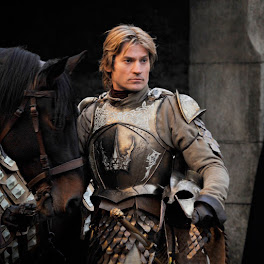
Jaime Lannister
Tenaka Khan, in The King Beyond The Gate, only holds to his oaths and honor because of his friendship with and personal loyalty to Ananais. And although Tirael of Stars may have swashbuckling glamour to spare in Daughter of Blood, the Darksworn antagonist, Thanir, is equally charismatic.
Conclusion
So on balance, while charisma undoubtedly helps to engage our reading interest, cheering for and
empathizing with protagonists, I don't believe it's essential to the making
of a Fantasy hero. :-)
© Helen Lowe
~*~
Previous Posts:
January: Looking Forward To An Heroic 2022
March: What Makes A Hero -- and The Call
April: What Makes A Hero #2: Circumstance
May: What Makes A Hero #3: Commitment
June: What Makes A Hero #4: Courage
July: What Makes A Hero #5: Challenge
~*~
About The Author:
Helen Lowe is an award-winning novelist, poet, and lover of story. With four books published to date, she is currently completing the final instalment in The Wall Of Night series.
Helen posts regularly on her “…on Anything, Really” blog, monthly on the Supernatural Underground, and tweets @helenl0we.






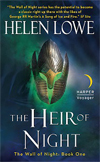
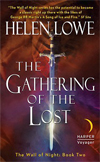
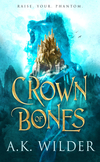
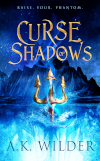
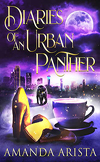
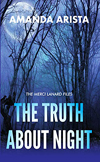

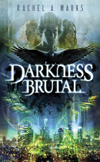
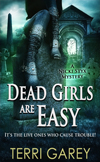
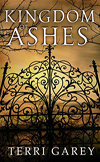
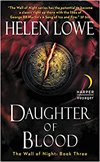
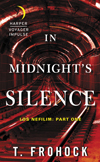
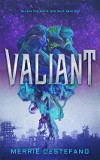
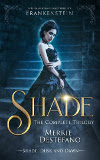

No comments:
Post a Comment